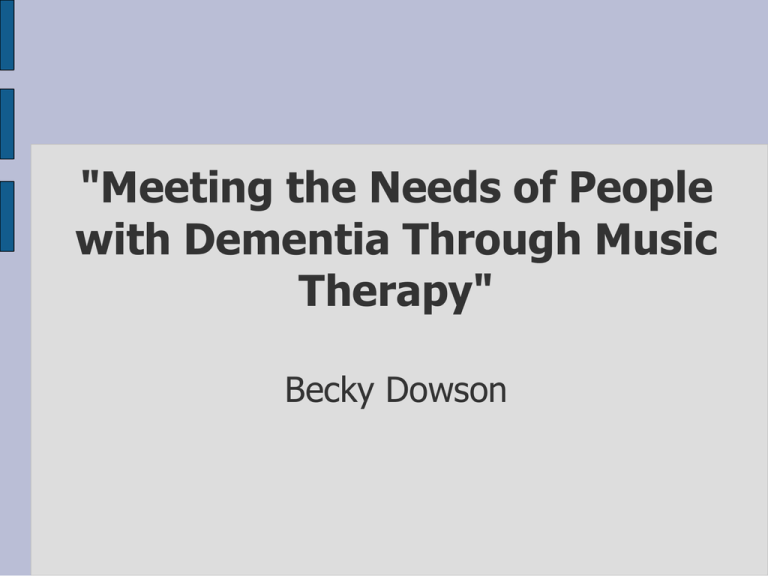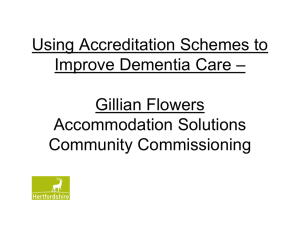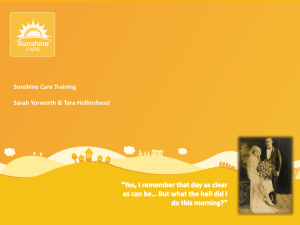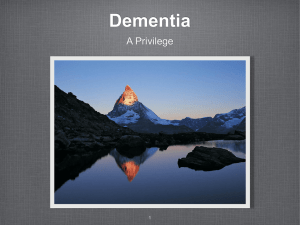Meeting the needs of people with dementia through Music Therapy
advertisement

"Meeting the Needs of People with Dementia Through Music Therapy" Becky Dowson Talk Outline General introduction to music therapy More detailed description of music therapy with people with dementia Case study with video extracts Conclusions My background Trained as a music therapist at Anglia Ruskin University. Now work freelance for Guideposts Trust – the majority of my work is with people who have dementia. Music Therapy in the UK Music therapy training in the UK is a Master's course (2 years full-time). Music therapists register with the Health and Care Professions Council. Music therapists work under supervision and practice CPD. What is Music Therapy? Music therapy is a psychological intervention which uses a variety of different types of music to draw the client into shared musicmaking, with therapeutic aims in mind. Both improvised music and pre-composed music are used. No need for the client to think themselves “musical” Client Groups Adults and children with learning disabilities or autistic spectrum disorders People with mental health problems Children/young people with EBD People with neurological conditions (e.g. TBI and stroke) People with dementia “With this whole client group what I have experienced is contact with that healthy side...with the cohesive side... rather than with the 'affected' side... I believe that the core of the human being is there and is unaffected – because that is what I am working with; this core of humanity can be contacted in this positive creative way... The music offers a place where the whole of the person can be integrated.” (from “Intimate Notes” by Mercedes Pavlicevic) Music Therapy with People with Dementia A way of making contact with people with dementia through a medium which still makes sense to them. Music therapy can help fulfil the needs of people with dementia outlined by Tom Kitwood. Music Therapy Groups Risk of isolation increased for people whose communication skills are impaired. Music therapy groups offer opportunity to use non-verbal communication. Chance to build new relationships with other group members, and strengthen existing relationships. Familiar Music Well-known songs and pieces often seems to provide a moment of clarity and focus to a person with dementia. Music often prompts reminiscences. Listening to familiar music can be a highly emotional experience. Improvised Music Gives clients the opportunity to anticipate and create new music alongside the therapist. Can be a very empowering experience. A medium for self-expression and a chance to discover new musical abilities. Previous Musical Experience Music therapy can give clients who have loved music or been musicians the chance to engage with music in a different way. Can be especially helpful if the client has lost the physical ability or the opportunity to express themselves musically. Some people have great sadness surrounding the abilities they have lost. Case Study Brian, a man in his 80s who has mild dementia. Has been having weekly individual music therapy with me for four months. Extract 1 “Somewhere” Extract 2 “I believe” Extract 3 “La Donna e Mobile” - cymbal and drums Extract 4 Improvisation with drum, cymbal and piano Summary of Case Study Music therapy gives Brian a chance to affirm his identity as a singer. It has also given him the opportunity to develop other parts of his musical personality. The therapeutic relationship is important in helping Brian feel secure enough to sing, play and express himself. Closing Thoughts What makes music therapy an especially suitable intervention for people with dementia? It is tailored to each client's unique needs As dementia progresses, music therapy can change and adapt It offers an opportunity for communication that does not depend on words It can help people to form new relationships and maintain old ones.









